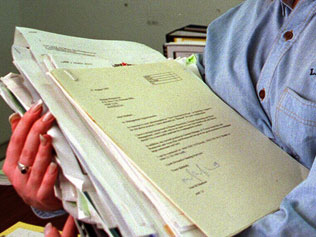Looking for a new job?
Does your job hunting plan look like this?
 Trawl through job ads on Seek, TradeMe Jobs and a couple of other sites
Trawl through job ads on Seek, TradeMe Jobs and a couple of other sites- Find jobs that look interesting and throw your CV at them
- Wait
- And wait some more
- And apply for some more (on the assumption that it takes 100 applications to get an interview)
- And wait some more
Does it feel like an enormous waste of time?
That’s because it is!
Try this 5 step approach instead.
5 Steps To You Finding The Job Of Your Dreams
1. Who do you want to work for?
Write a list of the top 3 places you want to work for.
Ignore the fact that they are not hiring right now. That doesn’t matter. Just do it.
Dream big.
Life’s too short to rely on job ads to tell you where you can work.
If you don’t know the company’s very well yet, research them thoroughly through their websites.
You might realise they’re not as awesome as you hoped. Fine, choose another for your top 3 list.
You might find a particular department which you think will feel like home, and you are confident you can make a real difference there and learn lots too. Great! This will give you the passion and energy to do what it takes to end up there.
2. Who’s the boss?
Your mission is to get a 45min meeting with the boss.
Your first reaction might be to contact the HR manager. Wrong! The HR manager can’t help you. They have an ancient recruitment process to follow. They are trained to say no to you.
Bypass them completely.
That’s why you’re going to talk to the boss.
You’ll need to get some background info so, using Google News searches, LinkedIn, his organisations website, and a search on the companies office, find out as much as you can about the boss.
3. How do you get a meeting with the boss?
There are 2 major barriers in your way to achieving this goal:
- Gate keepers blocking your access to the boss
- The bosses busy schedule
You are going to leap over these barriers.
Here’s how.
First, the receptionist is the gate keeper. They take their role seriously. They are trained to not forward calls that will waste their bosses time. If they sniff out that you are job hunting they will just stop you cold with “we’re not hiring right now” if they get the chance.
Here’s how to get past all that.
Call the receptionist and ask for the boss by their first name, say “Hello there receptionist_name, is Bob in this morning?”.
When the receptionist asks “who’s calling?” say only your first name. This creates the impression you are on a first name basis.
If you get asked “may I ask what this call is regarding?”, reply with “I’m just starting out in this industry and need career advice and I think Bob can help”.
Get through to their voicemail?
Leave a message like this: “Hi Bob, my name is John Doe, I need some advice on my career and I’m hoping you can help, I’ll call you back later”. Do not leave your phone number. Ever.
Get through to them?
Say this: “Hi Bob, I need some advice on my career and I’m hoping you can help. Can I buy you lunch on Thursday at name_of_the_best_cafe_nearby?”
This works for 4 reasons:
- You’re not asking for a job (very hard to give)
- You are asking for their advice (easy to give, and they are flattered to be asked, they want to “give back” to the next generation and this is their chance)
- Everyone eats lunch so it’s hard to say no to you
- You are inviting them to a Cafe they know is good (because you have already asked the receptionist for the name of a cafe nearby that is a favourite for most of the staff)
If Thursday doesn’t work for them, keep suggesting other days until they say yes.
Be persistent.
4. What do you talk about during the lunch appointment?
Your objectives are as follows:
- To appear interested, attentive, thoughtful, knowledgeable, and appreciative of their time
- To get them to generate a few names of who you should talk too next
The pretence is getting career advice, so briefly tell them what you’ve done so far, where you want to get to in your career (eg a job like theirs) and then ask them how to climb that ladder.
They’ll love to tell you their story.
Probe deeper with more questions during the telling of this story.
Take notes throughout. It shows that you value what they have to say.
Do not launch into a monologue all about you. Everything out of your mouth must be a question.
Towards the end, say “Thank you so much for your time today, who do you think I should talk too next?”
Ask them who they know who might be hiring now (or soon), or might have more career advice, or have another career story to tell you.
Write those contact details down. Ask them for a mobile number.
Each time they give you a name, ask “anyone else?” again and again until they say “No. That’s about it.”
5. What do you do with the names they give you?
For each name they give you you can take a huge shortcut in this process.
Ring them up, ask for them by their first name and when you get through say this: “I was having lunch with Bob from ABC Corp earlier today and he suggested I give you a call. I need some advice on my career. May I buy you lunch on Wednesday…”
6. How do you follow up?
Write a note in your diary to send a email in 2 weeks time.
In that email tell them how the meetings went with the people they recommended you talk to.
Give them an update on what you’ve learnt since you had a meeting with them.
4 weeks after that, find something you disagree with in a news article they have been mentioned in in the last 6 months and send another email stating your reasons why you disagree with their point of view.
Don’t ask (or beg) for a job.
Let them come up with the idea of offering you one.
Why you are doing all this?
Instead of spending your time trawling through job vacancies, and filling in applications, you are choosing to meet the key people in the industry you want to work in.
You will impress them with your get-out-there attitude, your ambition and your drive.
They’ll like you because these are qualities they have themselves.
You’ll remind them of a younger version of themselves and they’ll feel compelled to help you however they can.
If you impress them, they have the power to offer you a job on the spot. They have the power to tell the HR manager “I need this person, I don’t care if there are no vacancies, make one, and make it happen”.
Let’s pretend there are 6 major players in your industry that you would seriously like to work for.
Imagine that you’ve worked through the process above and made efforts to meet every boss.
Let’s recap what you’ve got:
- All 6 bosses know your name
- You’ve had lunch time meetings with 2 or 3 of these bosses
- You have a rare insight into career progression in this industry
Do you think that provides you with an advantage if a vacancy does pop up in the next few weeks?

 Trawl through job ads on Seek, TradeMe Jobs and a couple of other sites
Trawl through job ads on Seek, TradeMe Jobs and a couple of other sites